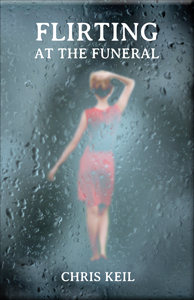‘Something was coming down the river, a bulging, asymmetric mass, dark with a streak of white across it’.
 The fact that Flirting at the Funeral opens with the image of a dead cow floating lifelessly down a river is perhaps testimony to Chris Keil’s ability to generate interest and mystery from even the most unorthodox scenes. Building on the enigmatic nature of this first image, the novel explores the lives of its characters as they try to reconnect with the past and each other. Having travelled together in their youth, and experienced 1970s Portugal in the grip of revolutionary fever, Morgan, Howard and Matty found their lives drifting apart in the intervening years. The story of the intervening years is never fully explained, invoking a sense of what Morgan describes as ‘holes in your memory’ of the past. Following an unsuccessful acting career and now working as a guide on historical tours, Morgan seeks out former pop star Matty, who has been reduced to singing in small clubs and bars in London in a bid to re-launch her career. Running parallel to Morgan’s desire to explore the past is the story of his friend Howard, a university lecturer who is struggling to cope with his wife’s slow decline due to the onset of Motor Neurone Disease.
The fact that Flirting at the Funeral opens with the image of a dead cow floating lifelessly down a river is perhaps testimony to Chris Keil’s ability to generate interest and mystery from even the most unorthodox scenes. Building on the enigmatic nature of this first image, the novel explores the lives of its characters as they try to reconnect with the past and each other. Having travelled together in their youth, and experienced 1970s Portugal in the grip of revolutionary fever, Morgan, Howard and Matty found their lives drifting apart in the intervening years. The story of the intervening years is never fully explained, invoking a sense of what Morgan describes as ‘holes in your memory’ of the past. Following an unsuccessful acting career and now working as a guide on historical tours, Morgan seeks out former pop star Matty, who has been reduced to singing in small clubs and bars in London in a bid to re-launch her career. Running parallel to Morgan’s desire to explore the past is the story of his friend Howard, a university lecturer who is struggling to cope with his wife’s slow decline due to the onset of Motor Neurone Disease.
As Morgan and Matty begin to rediscover their passion for each other, they also draw together the web of characters around them. Matty’s daughter Luisa, a film student, is preparing to produce a film for her final assessment and is introduced by Morgan to a play about revolution and politics in 1970s Eastern Europe. The play eventually begins to bind the characters as their own lives become entangled with the characters in the play and the sense of lost hope which they associate with the past.
Other reviews have drawn attention to the vivid detail evoked by Keil’s writing and here there is certainly much to admire. Starting in Wales the narrative encompasses a whistle-stop tour of a number of European cities, including brief scenes in Paris, Lisbon and London as the complex web of characters drift across each other’s lives. Stumbling across a protest in London the characters find themselves facing a crowd which was ‘starting to thicken around them, coagulating into an organism with a beating heart, fed by a spreading web of capillaries’.
Similarly, the politics which lie at the heart of the novel offer a sharp insight into the power of the super rich as the plot starts to gravitate towards the home of elderly lifestyle guru Arno Bendt. Willing to pay whatever price is necessary in order to secure his control over the lives of others, Arno soon becomes the planet around which the other characters orbit. To this end, Arno’s role as master puppeteer in the novel is gradually revealed through his slow seduction of Matty, starting with his power over her career and his ability to cancel her financial debts with his seemingly limitless supply of money.
Yet it is in Keil’s presentation of the female characters in Flirting at the Funeral that the novel occasionally falters. In particular, the presentation of Matty and Luisa is faintly depressing. Matty’s language often strikes a slightly unrealistic tone, peppered with an irritating array of ‘darlings’, ‘babys’ and the oft-repeated cry of ‘so sweet’. Consequently, her dialogue lacks sincerity and ultimately fails to be fully convincing. Likewise, Luisa initially expresses concern at her mother’s reliance on the omniscient Arno, describing the relationship as ‘creepy’ and urging Matty to maintain her independence. Later, however, Luisa appears willing to accept Arno’s financial assistance and hospitality in order to support the production of her film. Even the revelation that all of the guests at his centre, including herself, are being monitored by a range of surveillance technology is not enough to deter Luisa from accepting Arno’s offer of an all expenses-paid wrap party at a lavish hotel in Lisbon. It is this response which laces Luisa’s character with a slightly contradictory air, apparently at odds with her fiercely independent nature.
Ultimately, Flirting at the Funeral depicts a tale of missed opportunities and lost love, against the backdrop of growing political agitation and the power of money. The unusual title originates from Matty’s most successful pop song, which she describes as being ‘about making the best of things’, a sentiment which seems to summarise the development of many of the characters. Acting as a reminder of how the past can remain tantalisingly out of reach, the novel offers a snapshot of people fighting to make the best of things, while echoing Matty’s observation that in a society obsessed by fame and wealth ‘only the rich are free’.










